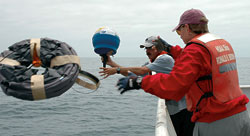 |
 Enlarge image
Enlarge image |
| WHOI’s Paul Bouchard (left) and NOAA Teacher At Sea, Eric Heltzel, launch a drifter that had been adopted by the WHOI Information Office and Exhibit Center. NOAA has deployed over 1200 drifting buoys that move with ocean currents around the globe collecting data using GPS and satellite technology. (Photo by Sean Whelan, WHOI) |
| |
| Related Links |
» Cooperative Institute for Climate and Ocean Research
|
The Cooperative Institute for Climate and Ocean Research
(CICOR) coordinates and fosters interaction between WHOI and
the National Oceanic and Atmospheric Administration (NOAA).
CICOR administers NOAA-funded research, builds ties between
researchers at WHOI and NOAA, and conducts education and outreach
activities. The Institute is one of 13 national cooperative
institutes.
CICOR’s research themes focus on climate, marine ecosystems,
and coastal research. The center supported 31 projects in
2005, totaling more than $7.5 million in funding. Since its
inception in 2001, CICOR has supported 88 research projects
and outreach activities, bringing the five-year budget to
more than $26 million.
One role of the NOAA Cooperative Institutes is to engage the
academic and private research communities in working with
NOAA to develop plans for research. Together with the Northeast
Science Center of NOAA’s National Marine Fisheries Service,
CICOR organized the Workshop on Planning Coordinated Research
on Ecosystems, Climate, and Policy in the Northeast in January
2005. The workshop brought together individuals from over
30 institutions representing NOAA staff, fisheries and marine
resource managers as well as scientists and oceanographers.
Participants identified management needs for new research
on harmful algal blooms, nutrients and contaminants, biodiversity,
and fisheries.
In 2005, the Institute also sponsored a variety of lectures
and outreach activities including an Indian Ocean Seminar
Series cosponsored with WHOI’s Ocean and Climate Change
Institute. The two-week seminar series brought to WHOI world-renowned
experts on the Indian Ocean from China, Australia, Japan,
and the U.S. to discuss research and observing systems that
would be most effective for improving understanding and predictive
capability of the ocean-atmosphere interaction in the Indian
Ocean.
In June CICOR underwent an administrative and science review
by an external science review team organized by NOAA. The
executive summary of the Review report suggested that the
successful national and international collaborations initiated
by CICOR should serve as models for the NOAA Cooperative Institute
community to enhance NOAA’s capacity building and education.
Subsequent to the review CICOR is reorganizing its fellows
to focus on key areas, such as coastal research, to promote
further collaborations among NOAA partners.
Among CICOR’s diverse research programs, the National
Office for Harmful Algal Blooms, directed by Don Anderson,
facilitated the rapid community response to the historic algal
bloom that hit the Northeast (see
Science Highlights section).
Robert Weller and Al Plueddemann’s work with the high-quality
Ocean Reference Sites (ORS) time series surface moorings continues
to provide essential data for improving our understanding
of atmosphere-ocean interactions and thus the efficiency of
climate models.
CICOR welcomed Jeremiah Hackett as a postdoctoral scholar
working with Don Anderson in the Biology Department. Jeremiah
completed his Ph.D. degree in genetics at the University of
Iowa and is now applying genomic data to the study of dinoflagellate
harmful algal blooms and toxin production. Nancy Grumet, the
CICOR-funded postdoctoral scholar in 2004 continues working
with Konrad Hughen in the Marine Chemistry and Geochemistry
Department. CICOR also supported three MIT/WHOI Joint Program
students during 2005: Rob Jennings (Biology) defended his
dissertation this year; J. Thomas Ferrar (Physical Oceanography)
continues his analyses of air-sea interaction and upper ocean
variability; and Carlos Moffat, who continues work with his
thesis advisors Robert Beardsley and Breck Owens in Physical
Oceanography on understanding the circulation of the coastal
ocean of the shelf west of the Antarctic Peninsula.
—Robert Weller, Director
|

